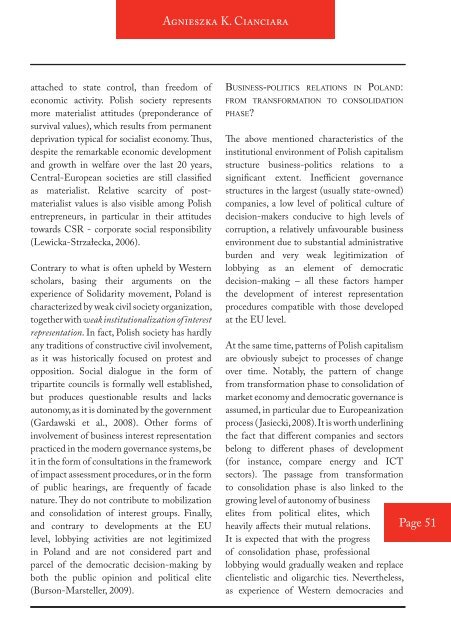Heft36 1 - SFB 580 - Friedrich-Schiller-Universität Jena
Heft36 1 - SFB 580 - Friedrich-Schiller-Universität Jena
Heft36 1 - SFB 580 - Friedrich-Schiller-Universität Jena
Create successful ePaper yourself
Turn your PDF publications into a flip-book with our unique Google optimized e-Paper software.
AGNIESZKA REFERENCES LITERATUR K. CIANCIARA<br />
attached to state control, than freedom of<br />
economic activity. Polish society represents<br />
more materialist attitudes (preponderance of<br />
survival values), which results from permanent<br />
deprivation typical for socialist economy. Thus,<br />
despite the remarkable economic development<br />
and growth in welfare over the last 20 years,<br />
Central-European societies are still classified<br />
as materialist. Relative scarcity of postmaterialist<br />
values is also visible among Polish<br />
entrepreneurs, in particular in their attitudes<br />
towards CSR - corporate social responsibility<br />
(Lewicka-Strzałecka, 2006).<br />
Contrary to what is often upheld by Western<br />
scholars, basing their arguments on the<br />
experience of Solidarity movement, Poland is<br />
characterized by weak civil society organization,<br />
together with weak institutionalization of interest<br />
representation. In fact, Polish society has hardly<br />
any traditions of constructive civil involvement,<br />
as it was historically focused on protest and<br />
opposition. Social dialogue in the form of<br />
tripartite councils is formally well established,<br />
but produces questionable results and lacks<br />
autonomy, as it is dominated by the government<br />
(Gardawski et al., 2008). Other forms of<br />
involvement of business interest representation<br />
practiced in the modern governance systems, be<br />
it in the form of consultations in the framework<br />
of impact assessment procedures, or in the form<br />
of public hearings, are frequently of facade<br />
nature. They do not contribute to mobilization<br />
and consolidation of interest groups. Finally,<br />
and contrary to developments at the EU<br />
level, lobbying activities are not legitimized<br />
in Poland and are not considered part and<br />
parcel of the democratic decision-making by<br />
both the public opinion and political elite<br />
(Burson-Marsteller, 2009).<br />
BUSINESS-POLITICS RELATIONS IN POLAND:<br />
FROM TRANSFORMATION TO CONSOLIDATION<br />
PHASE?<br />
The above mentioned characteristics of the<br />
institutional environment of Polish capitalism<br />
structure business-politics relations to a<br />
significant extent. Inefficient governance<br />
structures in the largest (usually state-owned)<br />
companies, a low level of political culture of<br />
decision-makers conducive to high levels of<br />
corruption, a relatively unfavourable business<br />
environment due to substantial administrative<br />
burden and very weak legitimization of<br />
lobbying as an element of democratic<br />
decision-making – all these factors hamper<br />
the development of interest representation<br />
procedures compatible with those developed<br />
at the EU level.<br />
At the same time, patterns of Polish capitalism<br />
are obviously subejct to processes of change<br />
over time. Notably, the pattern of change<br />
from transformation phase to consolidation of<br />
market economy and democratic governance is<br />
assumed, in particular due to Europeanization<br />
process ( Jasiecki, 2008). It is worth underlining<br />
the fact that different companies and sectors<br />
belong to different phases of development<br />
(for instance, compare energy and ICT<br />
sectors). The passage from transformation<br />
to consolidation phase is also linked to the<br />
growing level of autonomy of business<br />
elites from political elites, which<br />
heavily affects their mutual relations. Seite Page page 51<br />
It is expected that with the progress<br />
of consolidation phase, professional<br />
lobbying would gradually weaken and replace<br />
clientelistic and oligarchic ties. Nevertheless,<br />
as experience of Western democracies and
















